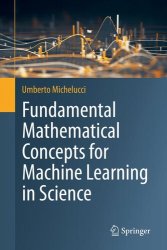Fundamental Mathematical Concepts for Machine Learning in Science
- Добавил: literator
- Дата: 18-05-2024, 10:51
- Комментариев: 0
 Название: Fundamental Mathematical Concepts for Machine Learning in Science
Название: Fundamental Mathematical Concepts for Machine Learning in ScienceАвтор: Umberto Michelucci
Издательство: Springer
Год: 2024
Страниц: 259
Язык: английский
Формат: pdf (true), epub
Размер: 10.1 MB
This book is for individuals with a scientific background who aspire to apply Machine Learning (ML) within various natural science disciplines—such as physics, chemistry, biology, medicine, psychology and many more. It elucidates core mathematical concepts in an accessible and straightforward manner, maintaining rigorous mathematical integrity. For readers more versed in mathematics, the book includes advanced sections that are not prerequisites for the initial reading. It ensures concepts are clearly defined and theorems are proven where it's pertinent. Machine Learning transcends the mere implementation and training of algorithms; it encompasses the broader challenges of constructing robust datasets, model validation, addressing imbalanced datasets, and fine-tuning hyperparameters. These topics are thoroughly examined within the text, along with the theoretical foundations underlying these methods. Rather than concentrating on particular algorithms this book focuses on the comprehensive concepts and theories essential for their application. It stands as an indispensable resource for any scientist keen on integrating Machine Learning effectively into their research.
Numerous texts delve into the technical execution of Machine Learning algorithms, often overlooking the foundational concepts vital for fully grasping these methods. This leads to a gap in using these algorithms effectively across diverse disciplines. For instance, a firm grasp of calculus is imperative to comprehend the training processes of algorithms and neural networks, while linear algebra is essential for the application and efficient training of various algorithms, including neural networks. Absent a solid mathematical base, Machine Learning applications may be, at best, cursory, or at worst, fundamentally flawed. This book lays the foundation for a comprehensive understanding of Machine Learning algorithms and approaches.
In this book, I discuss all the mathematical and methodological aspects that are important when using Machine Learning techniques in natural sciences (but not only). This book was written with a clear purpose: to explain the complexities of how to use Machine Learning to students and professionals in the natural sciences who may not have a background in Computer Science. It is a bridge connecting two seemingly disparate worlds and offers a comprehensive guide to understanding and applying the important techniques when applying Machine Learning in the context of science. I will not discuss algorithms or neural networks, but I will explain all the methods that you need to know to use them properly (e.g. model validation, sampling theory, etc.). The book is structured to gradually build your understanding, starting from fundamental mathematical concepts and progressing to advanced Machine Learning methods. Each chapter is designed to be self-contained, allowing the reader to focus on specific topics of interest. The chapters on calculus, linear algebra, and statistics are particularly crucial as they lay the foundation for a comprehensive understanding of Machine Learning algorithms and approaches. Given the breadth and depth of many topics, adequately covering each one would fill many books.
In Machine Learning, almost everything is a matrix (the weights of a neural network, the input dataset, etc.). All Python libraries that are used to implement and train neural networks today use multidimensional arrays as data types (the two most important libraries are PyTorch and TensorFlow). Arrays of numbers are so important that the name of the TensorFlow library from Google comes from Tensor, that is, in its most simple definition, a multi-dimensional array of numbers.
My aim has been to cover and explain the core concepts necessary for your journey. I highly recommend further exploring these topics through the additional readings and references that I provide throughout the text. As author, I have striven to present the material in an accessible, yet rigorous manner. The book relies heavily on mathematics as the language of Machine Learning, ensuring that concepts are conveyed with precision and clarity. Although the book does not delve into programming details, it points out its relevance in Machine Learning, especially considering Python. What sets this book apart is its focus on methods about how to use Machine Learning, and not on the algorithms themselves filling a gap in the existing Machine Learning literature. Whether you are a physicist, chemist, biologist, doctor, or involved in any scientific discipline, this book is your guide to harnessing the power of Machine Learning in your field (if you are a computer scientist, this book is for you too!). This book is a portal to the exciting world of Machine Learning, written to enrich your scientific research projects, and I hope spark a lifelong interest in this field. If you are an instructor, on the book webpage on Springerlink you will find an instructor guide that will help you to use this book for a course.
Скачать Fundamental Mathematical Concepts for Machine Learning in Science
Внимание
Уважаемый посетитель, Вы зашли на сайт как незарегистрированный пользователь.
Мы рекомендуем Вам зарегистрироваться либо войти на сайт под своим именем.
Уважаемый посетитель, Вы зашли на сайт как незарегистрированный пользователь.
Мы рекомендуем Вам зарегистрироваться либо войти на сайт под своим именем.
Информация
Посетители, находящиеся в группе Гости, не могут оставлять комментарии к данной публикации.
Посетители, находящиеся в группе Гости, не могут оставлять комментарии к данной публикации.
